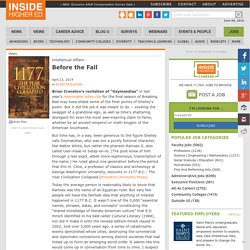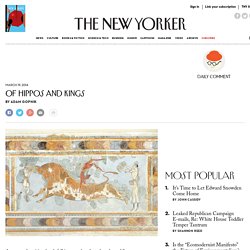

1177 avant J.-C., le jour où la civilisation s'est effondrée - Eric CLINE. Eric H. Cline, 1177 avant J.-C. Le jour où la civilisation s’est effondrée. 1177 avant J.-C. Le jour où la civilisation s'est effondrée. Vers - 1177, la civilisation de l'âge de bronze moderne autour de la Méditerranée s'est brutalement effondrée.

Il faudra attendre plusieurs siècles pour que la Grèce connaisse une renaissance culturelle. Que s'est-il donc passé il y a un peu plus de trois mille ans ? C'est à cette question que répond le professeur d'histoire et d'anthropologie américain Eric H. Cline dans un livre fascinant. Les premiers chapitres présentent la situation des peuples de la Méditerranée avant leur écroulement. Des causes naturelles et sociales Une bonne partie de la zone a connu une succession de tremblements de terre.
La période a de fait été marquée par des révoltes intérieures dans différentes civilisations de la Méditerranée. La fermeture des routes commerciales Mais pourquoi cette désintégration d'une mondialisation commerciale installée depuis plusieurs siècles ? Il n'y a donc pas de coupable idéal. System Failure: Eric H. Cline on 1177 B.C. – The Year Civilization Collapsed. Archeological investigation of the Eastern-Mediterranean Bronze-Age civilizations began in the late Nineteenth Century with Heinrich Schliemann’s work at Troy and Mycenae and with Sir Arthur Evans’ investigations on the island of Crete, principally at Knossos.

Language owes the label “Bronze Age” to the Greek poet Hesiod (Eighth Century BC) whose prototypical georgic poem Works and Days includes a discussion of the Five Ages of Man. As Eric Voegelin long ago pointed out, Hesiod’s five ages are actually three, in parallel with his three generations of gods. In Hesiod’s telling a primitive period comprising the Golden and Silver Ages gave way to socially complex and robust period comprising the Bronze and Heroic Ages; and the latter period, finding its conclusion in destructive internecine strife, gave way to Hesiod’s own degenerate period, what he calls the Iron Age. In his new book The Year Civilization Collapsed Eric H.
Cline brings a somewhat different tone to the same topic. Review of Eric H. Cline, '1177 B.C.: The Year Civilization Collapsed' Brian Cranston’s recitation of “Ozymandias” in last year’s memorable video clip for the final season of Breaking Bad may have elided some of the finer points of Shelley's poem.

But it did the job it was meant to do -- evoking the swagger of a grandiose ego, as well as time’s shattering disregard for even the most awe-inspiring claim to fame, whether by an ancient emperor or meth kingpin of the American Southwest. But time has, in a way, been generous to the figure Shelley calls Ozymandias, who was not a purely fictional character, like Walter White, but rather the pharaoh Ramses II, also called User-maat-re Setep-en-re. (The poet knew of him through a less exact, albeit more euphonious, transcription of the name.)
Of Hippos and Kings. A new and exciting book fell into my lap the other day, adding an archaic flavor to the current stew of apprehension and awe about where the world is going, and what we might find when it gets there.

The book, by Eric H. Cline, an archeologist and anthropologist, is called “1177 B.C.: The Year Civilization Collapsed.” It adds that remote date, previously inauspicious to all but scholars of the Late Bronze Age, to other, later ones—476 A.D., when Rome got sacked for good; 1348, the first year of the Black Plague; and that grim centennial favorite, 1914—as one more marker showing how a thriving civilization can gasp, fall over, and give up. Cline is concerned with figuring out all the ingredients in the “ ‘perfect storm’ that brought down the flourishing cultures and peoples of the Bronze Age—from the Mycenaeans and Minoans to the Hittites, Assyrians, Kassites, Cypriots, Mitannians, Canaanites, and even Egyptians.”
And then it all ended. Cline, E.H.: 1177 B.C.: The Year Civilization Collapsed. (eBook and Hardcover) In 1177 B.C., marauding groups known only as the "Sea Peoples" invaded Egypt.

The pharaoh’s army and navy managed to defeat them, but the victory so weakened Egypt that it soon slid into decline, as did most of the surrounding civilizations. After centuries of brilliance, the civilized world of the Bronze Age came to an abrupt and cataclysmic end. Kingdoms fell like dominoes over the course of just a few decades. No more Minoans or Mycenaeans. Amazon.fr - 1177 avant J.-C., le jour où la civilisation s'est effondrée - Eric CLINE, Philippe PIGNARRE - Livres.
Les ennemis venus de la mer. Voilà trente-deux siècles se produisait en Méditerranée orientale un désastre de grande magnitude.

Autour de 1200 av. J. -C., en l’espace de quelques décennies, toute la marqueterie de cités et d’Etats qui forment, depuis plusieurs siècles, une vaste région allant du Levant au nord de l’Afrique, et du monde égéen à la deuxième cataracte du Nil, se fracasse subitement. Les économies s’effondrent, les centres urbains se vident, les pouvoirs politiques sont détruits. Comment une civilisation s’écroule.